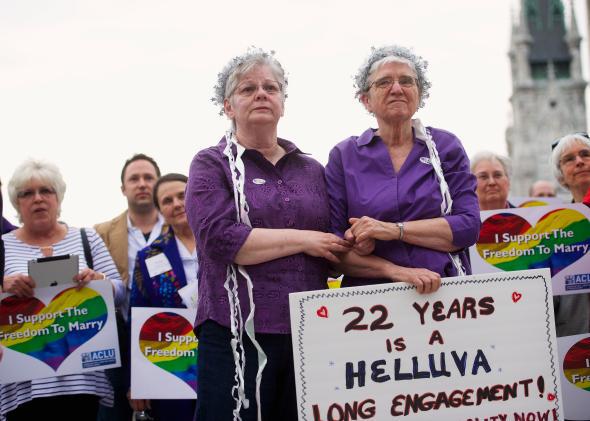More good news out of Pennsylvania, which just saw its gay marriage ban overturned by Rick Santorum-endorsed U.S. District Judge John E. Jones: Pennsylvania Gov. Tom Corbett has declined to appeal the ruling, opining that:
The case is extremely unlikely to succeed on appeal. Therefore, after review of the opinion and on the advice of my commonwealth legal team, I have decided not to appeal.
Corbett, a Republican, recently also gave up on his state’s voter ID law after a state court struck it down. (He claimed he wanted to save taxpayer money.)
His decision on Wednesday means same-sex marriages, which commenced in the state as soon as Jones handed down his order, can continue unimpeded. Marriage equality, in other words, is here to stay in Pennsylvania.
If your memory reaches all the way back to Monday of this week, you’ll recall that a nearly identical situation occurred in Oregon after its marriage ban was struck down. Without a governor or attorney general willing to go to bat for such a law, it’s essentially dead in the water: Since no private citizen is actually harmed by legal gay marriage, nobody but the state’s executive, acting for the state, has standing to step in and defend the ban in court. If the executive refuses, he functionally flat-lines the law in question.
There’s an interesting history behind this legal theory. A few years ago, California had a problem similar to Pennsylvania’s and Oregon’s: State officials refused to defend Prop 8, so its proponents—California citizens who really dislike gay people—intervened to defend it. But when their case arrived at the Supreme Court, five justices—including Chief Justice John Roberts and Justice Antonin Scalia—swatted them away, insisting that their lack of a “concrete and particularized injury” disqualified them from defending the ban. That ruling controls here and prevents a group like the National Organization for Marriage from defending Pennsylvania’s ban in court. The law is completely dead. There’s no turning back.
